The Magic Hour
The Magic Hour is Marsalis’ first jazz ensemble studio recording since 1999′s Marciac Suite. His last album was All Rise, an extended composition for big band, gospel choir and symphony orchestra. “All Rise was such a huge piece involving over two hundred people. I wanted to produce my next recording with a smaller group,” says the trumpeter, who settled into Right Track Studios in New York for two days last June to record the new album. “I wanted to restate my basic love of jazz music in a quartet format,” says Marsalis.
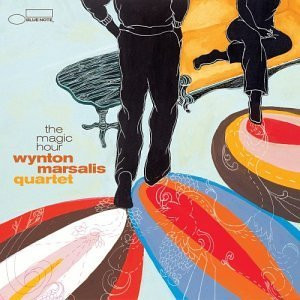
Album Info
| Ensemble | Wynton Marsalis Quartet |
|---|---|
| Release Date | March 9th, 2004 |
| Recording Date | June 6-7, 2003 |
| Record Label | Blue Note Records |
| Catalogue Number | 7243 5 91717 2 2 |
| Formats | CD, Digital Download |
| Genre | Jazz Recordings |
Track Listing
| Track | Length | Preview |
|---|---|---|
| Feeling of Jazz | 7:02 | Play |
| You and Me | 4:50 | Play |
| Free To Be | 8:39 | Play |
| Baby, I Love You | 5:20 | Play |
| Big Fat Hen | 7:31 | Play |
| Skipping | 8:01 | Play |
| Sophie Rose-Rosalee | 6:47 | Play |
| The Magic Hour | 13:15 | Play |
Liner Notes
Jazz is the music of amen; of yes, yes, yes; of I hear you!, of That’s what I’m talking about!, of Let’s get to the grits, of I know a place better than this, of All right now! It began in a revolutionary way and has remained revolutionary. The very idea is still astounding. A team of musicians, with very little written music and depending on very little repetition, can create something right on the spot. Fresh. Pull it out of the air, polishing it as it arrives.
Jazz is also the music of hope because it proves that we can count on the human being, we can trust in our collaborators to make the best decision right now and in almost every tomorrow. Jazz means we can improvise with individuality and empathy, we can be ourselves while paying attention to others and by counting on them. We can play. In our playing we can prove that the ultimate human solution is always some kind of elevated creation. So jazz challenges what we mean in an era so dominated by special effects because jazz musicians understand that, when all the hot air of talking is done, the truest special effect in the arts is always the human being. The human being is the one who understands and who wants to be understood. Therefore, jazz, so dependent on the flesh and blood special effect, the deeply human, always speaks across every barrier. Jazz accepts no divisions in the realm of understanding. It makes the moment better because, if the moment is an empty bag, jazz fills it with the gifts of feeling and artistry, offered to all, received by any.
Wynton Marsalis understands this well because the human drive at the center of jazz is what has made him the kind of musician that he is. He has learned from the masters who have affirmed the tradition and who, as men and women of wisdom, have offered him whatever they knew because they understood that the ongoing job of the veterans is to provide the young with the information necessary to reaffirm the highest achievements of the old and of their predecessors, the titans that added something special to the world.
Now that he is a veteran player himself, a celebrated bandleader, and an internationally revered composer, who has written for everything from trumpet alone to combined jazz and symphony orchestras, Marsalis is no longer reaffirming his art, he is affirming it with a broad scope of individuality. He is also nurturing those who are presently working at being able to affirm the art of jazz and to pass on to those below them what they have learned from the masters of this time. That is how it works and how it has always worked. There is no generation gap because, as Picasso said, “If art…cannot always live in the present, it must not be considered at all.” In other words, if it was ever truly good and alive, it is always truly good and always alive.
Essentially, this one right here is a jazz party record, the first to take the listener into Marsalis after dark, in his apartment, with friends from the world over and big fun going on. That is to say, that if you are ever at one of those Marsalis parties in which the groove is raising one foot up to the stars while the other is standing deep down in the ground, when the New Orleans cuisine is unforgettable, and one nicknamed “the Rilla,” is either already there or on the way to becoming drunk and incomprehensible, you might hear these kinds of tunes. Some are extremely soulful, some are funny, some are lyrical and some are played just because nobody cares about anything other than swinging and having a good time.
The young men on this recording have been coming to see and talk with Marsalis since they were kids. Now they are grown up and sound like it. Ali Jackson, says Marsalis, “has a supremely clear sound on his drums. The great drummer Oliver Jackson was his uncle and he knows about every aspect of playing jazz drums, every aspect. He’s from Detroit and he can also play that New Orleans groove better than anyone I’ve ever heard who wasn’t from the Crescent City.” Of the young bassist, the leader says, “Carlos came to every Blood on the Fields rehearsal back in 1994, when he was in high school. Carlos is always working because he can move back and forth from Latin grooves to hard swing with complete authority. Listen to that thick, resonating bass sound he gets. Seriously real and soulful. No amp.” The virtuoso pianist impresses him because, “Eric already has a totally recognizable sound and he can do things in the time that no one else can. I’ve been knowing him since he was a boy and I have no idea how many times he’s been over my house. It’s great to play with him now, a thrill.”
Diane Reeves and Bobby McFerrin are at the narrow peaks of their professions and need no more introduction than their names. They are also old buddies of Marsalis’s who, as they say, “go back.” Like everybody else, the singers bring the best that they’ve got, heavy soul, heavy style. Look out now.
For those who would know, the title track focuses– sweeping in its language from avant garde to down home–on a family moment. In this instance, we arrive when children are resisting going to sleep. They are running around and making noise in an attempt to cram all of the possible happiness into those last minutes before, as ordered, they must become horizontal and still until the next morning.
The time of sleep arrives through a process. It begins with calming the children down, getting them into pajamas, and making sure their teeth brushed. As usual, they pretend as long as they can that they either didn’t understand what was asked of them or that, if they are given just one more minute, they can finish what they are doing and, then, get right to bed. When they can no longer hold off getting ready for bed, they face the blues of playtime ending and begin thinking of a way to get that blues off of them.
Once the parents get them between the sheets and put the pillows in place, the children come up with a solution to the blues. The parents will have to become storytellers. They have to entertain the children with one kind of fantastic tale after another until a smooth story about something sweet and beautiful is delivered in both a soft voice and enough whispers to take the kids over the brim into that place where sleep has been waiting for them.
At this victorious point, that happiness rises up from the world of the children and inhabits the parents. It sneaks up on them but never catches them off guard because the parents have been waiting for that special happiness. In the virgin quiet of the night, their time has arrived. A joy no child ever experiences is upon them. It is the joy of romance. It is another bedtime story, one of the fairy tales that adults love to hear over and over, and to play their parts in whenever they get a chance, solely because romance provides the mask of magic that allows men and women to enter a sweltering and tender dreamland while wide awake. Mmm hm.
- Stanley Crouch
Credits
Wynton Marsalis, trumpet
Eric Lewis, piano
Carlos Henriquez, bass
Ali Jackson, drums
Bobby McFerrin, vocal on “Baby, I Love You”
Dianne Reeves, vocal on “Feeling of Jazz”
Produced by DELFEAYO MARSALIS
All compositions by WYNTON MARSALIS (Skayne’s Music/ASCAP) except “Baby, I Love You” composed by WYNTON MARSALIS (Skayne’s Music/ASCAP) and BOBBY MCFERRIN (ProbNoblem Music/BMI)
Recorded and mixed: PATRICK SMITH / Recorded: RIGHT TRACK STUDIOS, NYC, June 6 & 7, 2003
Mixed: GLENWOOD STUDIOS, Burbank, CA
Assistant Mixing Engineer: DANIEL KRESCO
Mastered: ARTISTIC STUDIOS, New Orleans, LA
Mastering Engineer: DARYL DICKERSON
Ali Jackson’s drums provided by Yamaha; sticks & brushes provided by Regal Tip.
Production Coordinators: ISOBEL ALLEN-FLOYD, GENEVIEVE STEWART & DENNIS JETER
Creative director: GORDON H JEE/ Art direction: BURTON YOUNT& RACHEL SALOMON
Illustrations by: RACHEL SALOMON
Package design: BURTON YOUNT
Product manager: SHANIEKA D. BROOKS
Personnel
- Eric Lewis – piano
- Carlos Henriquez – bass
- Ali Jackson – drums, tambourine
- Dianne Reeves – vocals
- Bobby McFerrin – vocals
Also of Interest
-
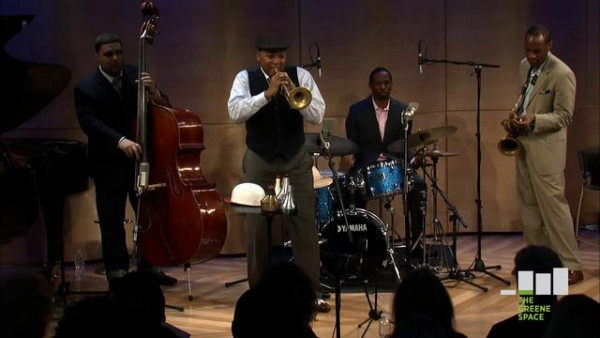 Videos
Videos
Free to Be - Wynton Marsalis Quintet live at The Greene Space, NYC
-
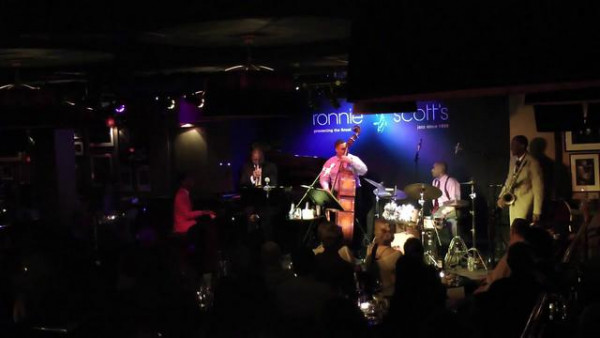 Videos
Videos
The Magic Hour - Wynton Marsalis Quintet at Ronnie Scott’s 2011
-
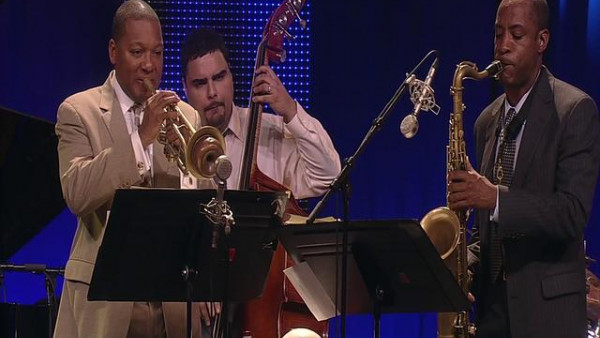 Videos
Videos
Sophie Rose-Rosalee - Wynton Marsalis Quintet at Jazz in Marciac 2011
-
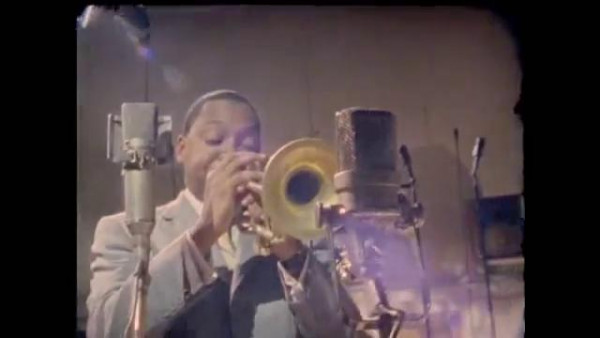 Videos
Videos
You and Me - Wynton Marsalis Quintet Live at Abbey Road
-
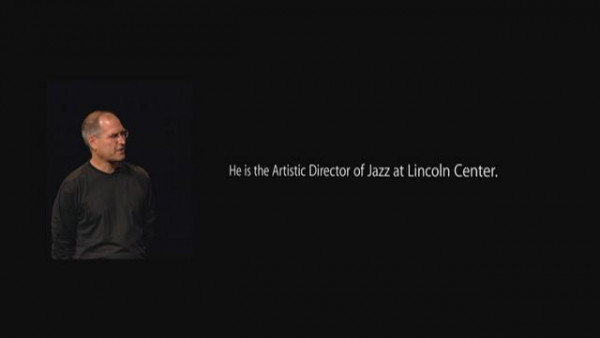 Videos
Videos
Wynton Marsalis’ “Encore” to Steve Jobs’ Keynote
-
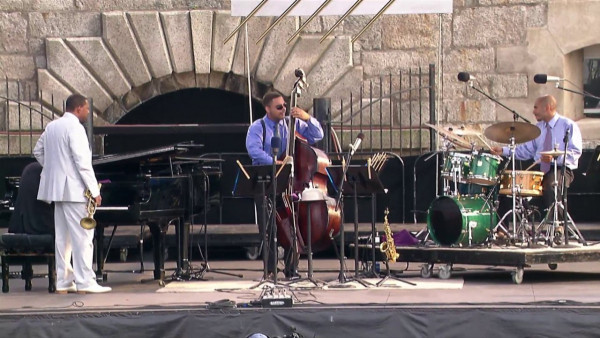 Videos
Videos
Free to Be - Wynton Marsalis Quintet at Newport Jazz Festival 2005
-
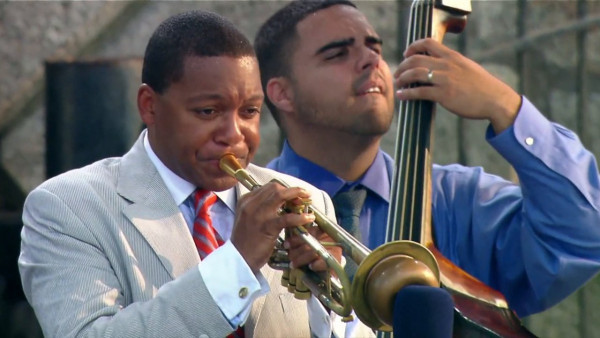 Videos
Videos
Sophie Rose-Rosalee - Wynton Marsalis Quintet at Newport Jazz Festival 2005
-
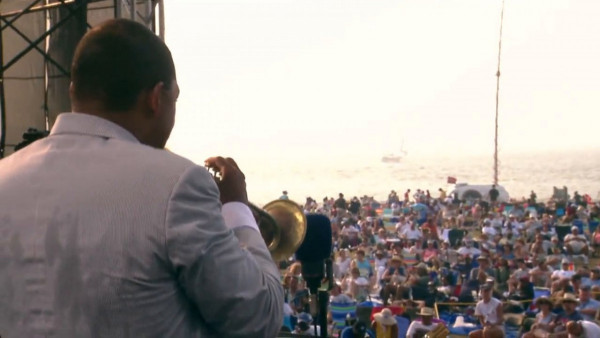 Videos
Videos
Big Fat Hen - Wynton Marsalis Quintet at Newport Jazz Festival 2005
